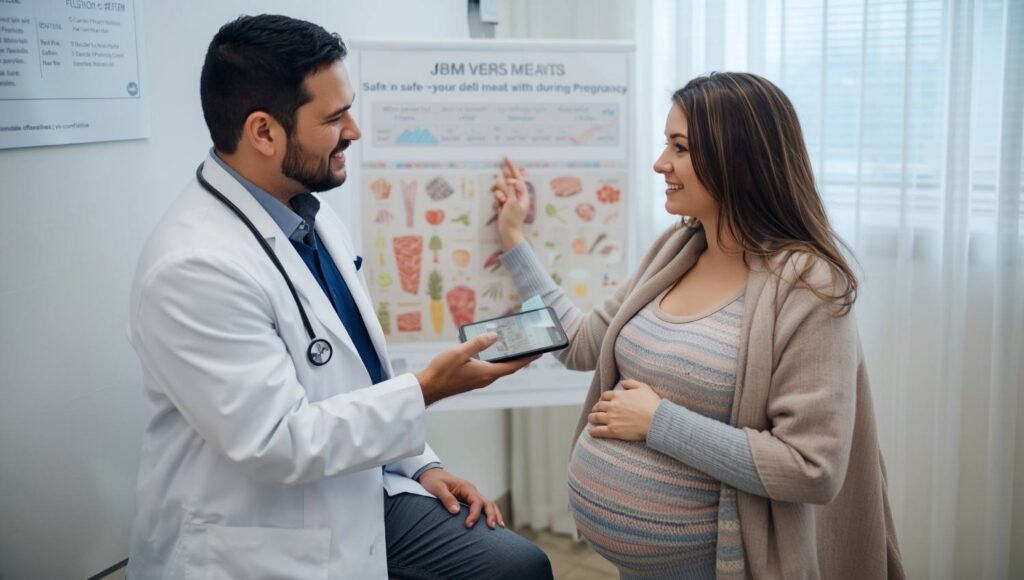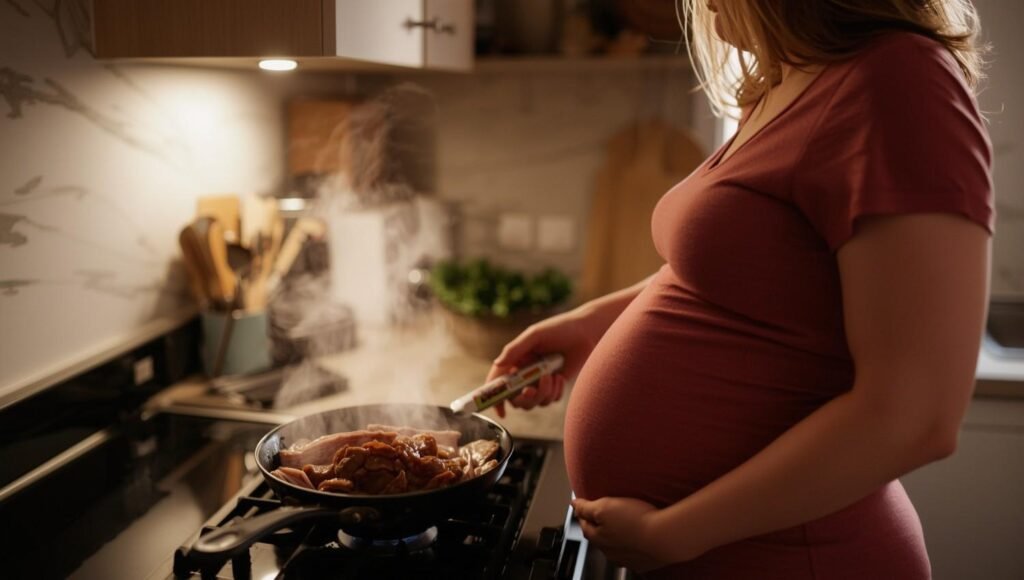Introduction
Deli meat and pregnancy often raises questions because pregnant people experience strong cravings and naturally consume extra foods as their baby grows and develops. While deli meat is commonly placed on the no-no list, it can still be nutritious and provide extra iron and protein that unborn babies need to stay healthy. Many even crave deli meat, wondering if it’s truly safe for pregnancy — especially when some meats safe to eat only become safe when cooked properly.
However, deli meats and lunch meats are often recommended to avoid because they can be a potential source of listeria, which may lead to listeria infection and serious risks. The bacteria is killed during cooking, which is why pasteurization and fully cooked meats are generally acceptable — even though doctors say don’t eat cold versions. If your concerns involve a turkey sandwich or ham sandwich, always consult with your doctor to avoid serious illness.
Is deli meat ever safe during pregnancy?
From my experience helping expecting moms plan safe meals, the biggest issue is temperature — not flavor. You can still enjoy familiar comfort foods if the deli meat is cooked properly and killed during cooking to eliminate listeria risk. This means choosing cooked meats, asking restaurants to heat your order steaming hot, or simply avoiding unheated lunch meats when unsure. Always prioritize stay healthy over convenience — and if in doubt, consult with your doctor first.

What they should eat?
Pregnant women often hear all kinds of advice about what they should eat, especially when cravings start and the body needs extra calories in each trimester. Most guidance points toward better nutrition and choosing a healthy diet that supports baby growth while still allowing enjoyment of food. The goal isn’t strict control — it’s responsible eating that helps avoid risks and supports long-term wellbeing.
In reality, it’s about making good choices, not following every opinion. With the right recommendations, guidance, and true dietary awareness, expecting mothers can easily understand what to eat and maintain balanced intake and proper nourishment as part of overall pregnancy care and health.
Myth No. 1: Eat anything you want!
A lot of people assume pregnancy is an all-you-can-eat situation because you’re eating for two, but that’s not really how it works. Yes, your body may need extra calories, but not from junk — especially not in the first trimester. As your needs increase in the second trimester and third trimester, the focus should be on whole grains, lean proteins, legumes, fruits, vegetables, and dairy products to stay healthy and support your baby properly.
Prioritizing higher calcium, fiber, and good water intake helps prevent issues like constipation while keeping energy steady. Pregnancy is not about overeating — it’s about portion control, not overeating, and following real nutritional guidance, not outdated myths.
Myth No. 2: You shouldn’t eat fish—and definitely not sushi.
It’s true that some fish are high in mercury, but not all are unsafe. In fact, certain low mercury fish like tilapia, catfish, and salmon are rich in omega 3 fatty acids, which support brain health for your baby. Most experts recommend two servings a week of safe fish for pregnancy safety, as long as you choose wisely and stay away from raw or high-mercury options.
Raw sushi can carry a bacteria risk, which is why caution is necessary. However, many Japanese women traditionally eat fish throughout pregnancy with no issues — the key is moderation and choosing cooked sushi, like salmon nigiri that is fully heated and safe.
Read our Article about (Eating sushi in pregnancy)
Myth No. 3: Cheese plate? No thanks.
Not all cheese is unsafe — the real concern is unpasteurized cheese, which carries a bacteria risk that could affect your unborn child. Choosing pasteurized cheese is usually completely safe, even if it’s a soft cheese, as long as you read labels carefully. In some European countries, unpasteurized options are still common, so the infection risk may be higher when traveling.
It’s not about avoiding cheese altogether — it’s about reducing safety concern and being aware of how to avoid contamination.
Myth No. 4: Don’t visit the deli counter or have a hot dog.
There is a small risk of deli meats and hot dogs being linked to listeria contamination, but surprisingly, the most recent outbreak was actually traced back to vegetables. An occasional turkey sandwich or hot dog isn’t automatically dangerous — as long as it’s heated steaming hot to reduce risk.
Experts mainly emphasize safe consumption, temperature awareness, and proper food safety — not a complete ban. When in doubt, follow simple cooking advice: heat it well, then enjoy.
Myth No. 5: Can that caffeine-rich coffee.
You can still enjoy coffee — as long as you stay within the caffeine limit of 200 milligrams per day. For reference, an 8-ounce coffee has about 100mg, black tea has 50–60mg, and an espresso shot around 50mg. If needed, caffeine-free soda is an option — but keep in mind it still contains high sugar and chemicals.
Good hydration should always come first, and water recommended remains the best choice. Just stick to the pregnancy safe limit, and you don’t need to cut coffee completely.
Myth No. 6: A small glass of wine—or a puff or two from a cigarette or e-cig—is fine now and then.
There is no safe amount of alcohol, smoking, or vaping during pregnancy. Even secondhand smoke has fetal risk, so experts strongly warn against all forms of exposure. The problem is that research cannot confirm safe level, so the safest option is to avoid completely — no exceptions.
Other Myths Busted
Not all common beliefs are true — for example, exercise is safe during pregnancy as long as you start slow and stop if dizzy. Many moms are also surprised to learn that hair coloring okay, and even lifting your arms overhead is safe despite old wives’ tale rumors. What matters most is following safe pregnancy practices that are doctor-approved, instead of stressing over outdated pregnancy myths or random advice.

WHAT ARE SOME RISKS AND PRECAUTIONS WHEN IT COMES TO DELI MEAT?
Listeria bacteria is the biggest concern, as pregnant women with weakened immune systems are more vulnerable while their body protects the developing baby. A listeriosis infection can lead to serious complications such as miscarriage, stillbirth, premature delivery, or a life-threatening infection in the newborn. That’s why CDC recommendations often advise avoiding deli meat altogether due to the increased risk.
If you must have it, choose reputable providers that follow strong food safety standards like proper refrigeration temperatures, safe handling, and proper storage of cold cuts. Whether it’s a turkey sandwich or another craving, always stay cautious during pregnancy and heat it thoroughly to be safe.
WHAT ARE SAFER CHOICES FOR WOMEN WHO CRAVE DELI MEAT DURING PREGNANCY?
If cravings hit, cooked meats like roasted turkey breast slices are safe to eat, as long as they reach an internal temperature of 165 degrees Fahrenheit. You can also steam deli meats to lower risk of listeria before eating. Look for pre-packaged meats that have been handled properly and stored properly, and pair them with hard cheeses or pasteurized cheeses for delicious sandwiches. These are safer options that satisfy pregnancy cravings while offering safe alternatives to cold deli meats.

HOW DO YOU HANDLE AND COOK DELI MEATS SAFELY DURING PREGNANCY?
To stay safe, treat food cravings carefully and avoid cross-contamination. Always ensure deli meats are cooked to 165 degrees Fahrenheit to kill listeria bacteria. Steaming deli meats until hot is another effective method. Never leave them at room temperature — they must stay in a refrigerator at 40°F or colder, stored safely, and handled properly to avoid infections. These habits form essential pregnancy safety practices that prevent contamination.
High-Risk Deli Meats to Avoid
Some meats are much riskier, such as hot dogs, lunch meats like turkey, chicken, ham, and bologna, or any cold cuts not heated to 165°F. Also avoid items high-risk for listeria infection like salami, pepperoni, dry sausages, fermented meat, dry-cured meat, and anything made with unpasteurized milk or soft cheeses. Pre-packaged deli meats or items sliced at deli counter can still be unsafe if mishandled — always check for any listeria contamination recall.
Keep in mind, deli meat isn’t the only food that presents an increased risk of listeria monocytogenes. Other potential dangers include:
Foods like refrigerated pâté, smoked seafood, soft cheese, raw fruits, unwashed vegetables, raw meat, undercooked meat, raw eggs, raw seafood, raw poultry, and sushi with raw fish are also increased risk foods. These are common foodborne illness sources, especially linked to listeria monocytogenes, so extra caution is needed beyond deli meat alone.
HOW DO YOU KNOW IF YOU HAVE A LISTERIA INFECTION?
Early signs may feel like mild flu-like symptoms such as fever, chills, muscle aches, or stomach problems. Some even experience stiff neck, headache, confusion, or loss of balance, while many don’t know they have symptoms at all. It becomes more serious during pregnancy, as high fever, vomiting, or dehydration may trigger preterm labor. Ensuring food completely safe is the best way to reduce risk for you and your baby.
ARE THERE ALTERNATIVES TO DELI MEATS?
Pregnant women can turn to alternative protein sources like cooked chicken or cooked fish, which are safe and nutritious when freshly prepared. You can also choose whole cuts of meat such as turkey breast or roast beef, or even enjoy plant-based protein from beans or tofu for a lighter option.
For those who still want a deli-style taste, there are deli meats made from cooked meats like chicken or turkey, as long as they are heated properly. Always consult with your doctor to ensure ideal food safety during pregnancy.

HOW CAN WOMEN MAKE SURE THEIR FOOD IS SAFE DURING PREGNANCY?
The most important step is being aware of risks and learning how to handle food safely. Always choose alternatives to deli meat or ensure it is heated up to safe temperature using a food thermometer. Following CDC guidelines and staying in touch with your doctor helps ensure a healthy and safe pregnancy with the right precautions and safe consumption practices at all times.
Frequently Asked Questions (FAQs)
1. Can I eat deli meat while pregnant?
Yes — but only if it’s cooked or heated until steaming hot (165°F). Cold deli meat should be avoided due to the risk of listeria infection.
2. What happens if I accidentally ate cold deli meat?
Don’t panic. Just monitor for symptoms like fever, chills, nausea, or stomach upset. If anything feels off, contact your doctor immediately.
3. What are safer alternatives to deli meats?
Options like cooked chicken, roast turkey breast, roast beef, cooked fish, beans, and tofu are great safe alternatives during pregnancy.
4. Is it okay to eat deli meat from restaurants or sandwiches outside?
Only if you know it was heated properly. If you’re unsure, always ask for it to be served steaming hot — not lightly warmed.
5. Can I eat cheese on my sandwich if I avoid deli meat?
Yes — pasteurized cheeses like cheddar, mozzarella, and cream cheese are safe to eat during pregnancy.
6. How do I make deli meat safe at home?
Simply heat deli meat to 165°F in a pan, oven, or steamer until it is piping hot and steaming.
7. Is craving deli meat normal during pregnancy?
Absolutely — food cravings are very common. Just make safe choices and check with your doctor when unsure.

